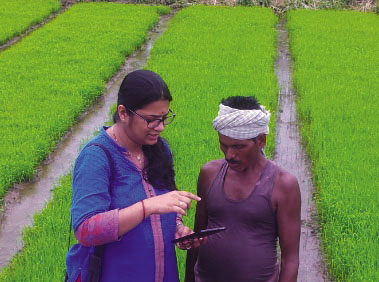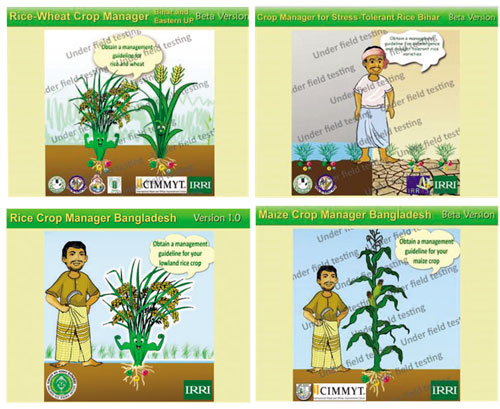By Anuradha Dhar/CIMMYT
In South Asia, 90 percent of smallholder farmers using fertilizer lack access to soil testing services. Due to blanket recommendations, the application of nutrients is not well-matched to the local requirements of the soil and crop. Also, excessive and imbalanced use of chemical fertilizers can result in the deterioration of soil fertility. This is becoming a cause for concern to the Indian agriculture sector. According to a study published in the Journal of the Environment, Development and Sustainability, India is losing soil 30 to 40 times faster than the natural replenishment rate. The solution lies in part in having a precise, site-specific nutrient management approach that will build a sustainable and profitable agriculture sector.

A decision-making tool called Crop Manager is being developed by the Cereal Systems Initiative for South Asia (CSISA), in collaboration with the International Rice Research Institute (IRRI), state universities and government partners. Crop Manager will provide location specific fertilizer recommendations to farmers growing rice and maize in Odisha state, and to farmers growing rice, wheat and maize in Eastern Uttar Pradesh and Bihar states. A version of the tool, Rice Nutrient Manager, is also being developed by CSISA in the Cauvery Delta of Tamil Nadu state, to support and complement the existing crop management advisory services of the state government. The partners are in the advanced field testing phase and are fine-tuning the tools prior to official release.
Crop Manager is an expanded version of Nutrient Manager, which was first conceptualized and released by IRRI in the Philippines in 2009. Crop Manager combines improved nutrient management with field-specific, best bet crop management guidelines to address three to four of the main agronomic constraints, in addition to fertilizer recommendations.
Fast and Futuristic
Crop Manager is accessible in both web-based and mobile Android formats, with a simple, user-friendly interface providing personalized fertilizer guidance for small-scale farmers and extension workers. To use the tool, farmers provide information about their fields by responding to a set of 12-15 brief questions about field location, planting method, seed variety, typical yields, choice of fertilizer, method of harvesting and other factors.

Based on these inputs, the tool recommends the ideal amount of nitrogen (N), phosphorus (P) and potassium (K) nutrients to be added at critical growth stages to increase yield and profit, while taking into account the amount of fertilizer the farmer prefers to use. With a connection to the Internet, farmers can receive advice instantly on mobile devices. Information from Crop Manager will be available in Hindi, Odiya and English. An interactive voice response system in being planned, to guide the user through the survey using a recorded questionnaire.
India has 110 million mobile Internet users, of whom 25 million are in rural areas. “With mobile phone and internet penetrating fast in rural India, these ICT tools will serve as a useful platform to provide information to farmers easily, and at the time when they need it,” said Sheetal Sharma, a CSISA nutrient management specialist. Sharma added that these tools are based on strong scientific principles, and have an edge over traditional soil testing methods, which usually take more time to give recommendations and require farmers to carry soil samples to a testing facility. CSISA released a similar tool named Rice Crop Manager in Bangladesh last year to increase a farmer’s income by US $100 per hectare, per crop. This is a significant increase in a nation where farmers’ average income is less than $600 per year.
With the help of technologies like Crop Manager, CSISA hopes that farmers in South Asia will be able to replicate the high-tech precision farming used in developed countries with easy-to-use and low-cost options. The development of these products serves as a reminder that farmers are capable; they just need the right tools.
 Capacity development
Capacity development 
